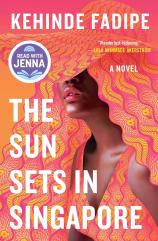Reading Group Guide
Discussion Questions
The Sun Sets in Singapore

1. At the beginning of the novel, Dara reveals that she’s dedicated the last six years of her life to work, prioritizing her career over personal relationships. Did you admire Dara’s unwavering commitment to her career? Or did you find yourself questioning her prerogatives? In your own life, where do you prefer to channel your energies?
2. Before Dara moved to London to live with her mother, she lived in Lagos with her maternal grandparents. Other than a respect for formality, what do you believe Dara inherited from Granee and Grandad? How do you think being raised by grandparents who loved Nigeria, and then a mother who rejected her Nigerian identity, impacted Dara’s perception of her heritage?
3. Amaka buys luxury items to temporarily relieve the pain and resentment she feels toward her family, but the consolation is always short-lived. When did you realize that Amaka’s coping mechanism was having its own detrimental effects? Have you ever had a friend or family member fall into a similar situation? How did they work through it?
4. Discuss the mixed feelings Lillian has about her piano --- the reasons she played and stopped playing, the connections it gave her to her parents and her past, her resentment and appreciation for it, etc. Symbolically, what did the piano represent?
5. Amaka’s mother, Ugo, was constantly worried that Amaka would “repeat her mistakes” and find herself in a situation that would force her to rely on a man’s generosity. Even as Amaka made a significant amount of money as a credit risk officer, this apprehension never went away. Do you think Amaka ever internalized this worry? How would this have impacted her relationship with Rohit, despite his kindness and reliability? Considering Amaka’s childhood, do you think her anxiety regarding men stemmed more from her father or her mother? Why?
6. Lillian moved to Singapore with her husband, Warren, when he was transferred for work. Leaving Philadelphia, however, made her feel unmoored, lonely and isolated. Have you ever made a similar move in your life, one that forced you completely out of your comfort zone? How did you handle the stress and uncertainty? By contrast, how did you handle the excitement? Explain.
7. At her therapist’s office, Lillian admits that, since she was young, she’s struggled to make life-altering decisions, like whether to have a child or not. Have you ever similarly struggled? Who do you lean on when you have to make difficult choices? If you had met Lillian in real life at this stage in her journey, what advice would you have given her?
8. Lillian and Amaka (and an initially reluctant Dara) take part in an expat book club in Singapore. How did the book club foster a sense of community among its members?
9. Out of all the book club members (Kike, Yemisi, Nana and LeToya), which character did you respond to the most? At the first meeting, what book would you have recommended that everyone read next?
10. Because Ugo’s traditional marriage to Chukwu was dissolved, and he legally married another woman, Amaka and Ugo lived apart from him, which put a great strain on the family. How did you feel, learning the details of Amaka’s family dispute? Did you find yourself leaning toward the side of Amaka and Ugo or the side of Amaka’s half-siblings? Why? How would you have navigated such a conflict?
11. In Kike’s dressing room, Dara makes the following remark: “That Kike Ibusun was not the sharpest tool in the box was what Dara suspected she wanted you to believe. Dara had spent too long as an outsider at school and at Oxford not to recognize the sharpness behind that public-schoolgirl insouciance. Pretending to be thick was a privilege only girls whose parents had spent half a million pounds on their education could afford.” Unpack the implications of this observation, accounting for Kike’s unique family circumstances. Why do you think a privileged, highly educated young woman like Kike would deliberately hide her intelligence? What purpose would it serve?
12. Dara also finds it ironic that Kike --- the well-connected daughter of a former governor --- disapproves of the fact that Lani “had help” getting his role in Geneva: “Maybe when you [stand] on a mountain for so long, the ground [starts] to feel flat.” Discuss the many ways in which the author calls attention to nepotism and class divides throughout the novel. Did you agree with Dara that Kike was unaware of her privilege in this scene?
13. The author describes the atmosphere and topography of Singapore throughout the novel, imbuing the story with real-world charm. As you were reading, what setting piqued your interest the most? Fort Canning, where Dara and Amaka went for their run? Sentosa, where Amaka and Lani had their first date? The Botanic Gardens, where Lillian and Warren had their conversation? Yishun, where Lillian moved to and had dinner with Amaka at the open-air market? Why?
14. Discuss Lillian’s research into reincarnation and the events that prompted her to pursue this line of inquiry. If Lillian had shared her speculations with you directly, how would you have responded? What are your own thoughts on reincarnation?
15. Discuss the ways in which the author highlights the economic disparities in Singapore, such as Amaka’s comment to Lani about the gap between the wealthy and the underserved; the cost of rent that Lillian considers when moving to Yishun; or the fact that residents are surrounded by luxury brands but also migrant workers, laborers who sacrifice time with their families in order to make a living in Sing dollars, often residing in cramped living quarters with extremely controlling managers.
16. At Kike’s party, Nana reprimands Dara for not reading books authored by writers like Teju Cole, Helen Oyeyemi and Noviolet Bulawayo: “You’re basically reading a bunch of books by dead white men and leaving no space to discover your own writers.” Did you agree or disagree with Nana in this moment? When you’re choosing new books or new writers to read, what factors do you take into consideration? While reading, what is most important to you?
17. Discuss how friendships grew and changed throughout the course of the novel between Dara, Amaka and Lillian. How did the women lean on one another? How did they hurt one another? How did they rebuild trust after it had been broken? How have friendships in your own life been ruptured and mended, and what have you learned about yourself --- and others --- navigating these experiences?
18. Throughout the novel, Lillian has a recurring dream where she’s drowning. What elements of her past were folded into the dream, and how did you feel reading the hypnotherapy scene in which Lillian worked through these memories with Dr. Geraldine?
19. The author weaves Greek mythology throughout the text, especially in Dara’s point of view. How did the mythological references parallel the plot of THE SUN SETS IN SINGAPORE? Did the allusions enhance your experience of reading the book? Why or why not?
20. How did you feel about the end of the novel and the resolutions that were offered for each character? Ultimately, did events play out differently than you expected? Why or why not?
The Sun Sets in Singapore
- Publication Date: July 9, 2024
- Genres: Fiction, Women's Fiction
- Paperback: 368 pages
- Publisher: Grand Central Publishing
- ISBN-10: 1538741504
- ISBN-13: 9781538741504







